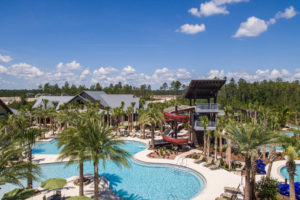 By: Gary Davis, Realtor©
By: Gary Davis, Realtor©
So, what are these CDD fees all about?
One of the most common questions I hear from people looking to buy a home in St. Johns or the surrounding areas is “what is this CDD fee thing I see on the listing?” This isn’t surprising, though, because most people are moving from areas that don’t have these fees. In fact, when I first moved to St. Johns, I didn’t know either. So, grab a snack, sit back, and read on – the exciting world of CDDs and CDD fees awaits!
The acronym CDD stands for Community Development District. A CDD is an independent, special purpose government entity typically established by a developer with governmental approval. CDDs were created by the Florida Legislature in the 1980’s and are governed by Florida State Statute, Chapter 190.
CDD fees were created to allow developers to acquire, operate, and maintain infrastructure systems, improvements, and services for planned communities in the most cost-effective way possible. The use of CDDs helps create and maintain infrastructure without overburdening local governments or taxpayers.
 CDDs are helpful because they allow for the development of communities using long-term tax exempt bonds. Through these bonds, the developer can install infrastructure such as roads, underground utilities, bridges, water and sewer facilities, retention ponds and streetlights. As homes in the development are sold, the buyers pay for the bonds through an Ad Valorem tax over a specified time period. Bonds are commonly issued for 20 or 30 years, so, for example, if a CDD issued a 30-year bond in 2005 and someone purchases a home in that community in 2010, they would continue paying the bond for the remaining 25 years of the bond’s life.
CDDs are helpful because they allow for the development of communities using long-term tax exempt bonds. Through these bonds, the developer can install infrastructure such as roads, underground utilities, bridges, water and sewer facilities, retention ponds and streetlights. As homes in the development are sold, the buyers pay for the bonds through an Ad Valorem tax over a specified time period. Bonds are commonly issued for 20 or 30 years, so, for example, if a CDD issued a 30-year bond in 2005 and someone purchases a home in that community in 2010, they would continue paying the bond for the remaining 25 years of the bond’s life.
By law, CDDs are governed by a Board of Supervisors who are elected on the local ballots and sworn into office. When a CDD is first established, the board is usually comprised of the developer and his/her chosen, qualifed representatives. As the district grows in population, however, board seats begin to be filled by homeowners within the district until, eventually, the board is comprised solely of elected property owners. I serve on the CDD board in the neighborhood where I live, Aberdeen, and our CDD board is comprised completely of residents. We meet each month to discuss CDD issues and make decisions for our community. Meetings are announced ahead of time and are open to the public. I highly encourage anyone living in a CDD community to attend at least one meeting in order to better understand what your CDD Board does.
The amount of the CDD fee imposed on a home varies by community and is also often dependent upon the lot size of the resident’s property (for example, a 60 foot lot would likely have a lower CDD fee than an 80 foot lot). CDD fees in our area can range anywhere from $400 to over $4,000. Fees for any property can be found by going to the tax roll and looking at the Ad Valorem taxes; if the property has CDD fees, they will be listed there. If you have a mortgage on your home and use an escrow account for taxes and insurance, the CDD fee will be escrowed there as well and you will pay 1/12 of it each month of the year just as you do your taxes and insurance. If you do not have an escrow account you will be expected to pay your CDD fees annually along with your property taxes in one lump sum.
It’s important to note that the CDD fee is comprised of two parts: the bond portion and the Operations and Maintenance (O&M) portion. The bond portion will eventually be paid off based on the term of the bond, but the O&M fee will continue to be assessed to cover the costs of maintaining CDD property, facilities, and services. O&M fees can fluctuate depending on the needs of the community, but usually will not change drastically.
 Another important point about CDDs is that they are different than HOAs and many communities have both. The CDD and HOA govern totally different aspects of a community and, usually, these aspects do not overlap. Most communities with CDDs also have amenities such as pools, tennis courts, clubhouses, parks, playgrounds, and/or gyms. CDD fees help build and maintain these facilities. Many times I am asked if people should or should not buy in a community that has CDD fees. In these instances, I encourage them to weigh how important it is for them to have access to amenities. If amenities are important, a community with CDD fees may make sense. Conversely, if the opposite is true, a CDD-free community might be the best fit.
Another important point about CDDs is that they are different than HOAs and many communities have both. The CDD and HOA govern totally different aspects of a community and, usually, these aspects do not overlap. Most communities with CDDs also have amenities such as pools, tennis courts, clubhouses, parks, playgrounds, and/or gyms. CDD fees help build and maintain these facilities. Many times I am asked if people should or should not buy in a community that has CDD fees. In these instances, I encourage them to weigh how important it is for them to have access to amenities. If amenities are important, a community with CDD fees may make sense. Conversely, if the opposite is true, a CDD-free community might be the best fit.
I’m hoping that your understanding of CDDs and their associated fees is now slightly clearer than mud … yes, they can be a bit complex! If I can answer any questions or point you in the direction of more information, please don’t hesitate to reach out.

